Alison Marjorie Ellen Vernon (1925-2006)
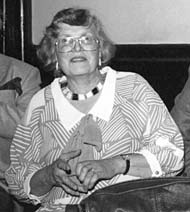 Birth:
Birth: 28 May 1925
Birth Place: Eastbourne, Sussex, England
Death: 18 Jun 2006 Age: 81
Death Place: Ward 3C, Raigmore Hospital, Inverness
Burial Place: Cromarty Churchyard
Father: George Ernest VERNON (1902-1986)
Mother: Marjorie Minnie VERNEY (1902-1971)
Spouse: Alastair DUNN (1925-2007)
Marr Date: 26 Mar 19511
Marr Place: Christ Church, Eastbourne, Sussex
Children:
Alexander DUNN(1951-)
Angus DUNN (1953-)
Fiona DUNN (1956-)
Helen DUNN (1958-)
Colin DUNN (1962-)
Jane DUNN (1964-)
Occupation: Ran Cromarty Pottery from 1965 to 1990
Notes about Alison: She was affectionately called ‘The Boss’ by her family.
Know more about Alison? Please email me with information. Thank you.
Memories of Alison from her friends in Eastbourne:
Although Alison had last seen some of these friends when she was married, more than 50 years ago, she still corresponded with them regularly.
Tessa Morton:
Her parents and mine knew each other when young - going to dances - but I know very little of Alison's past so can’t help with family history research as we were never into our ancestors as people are today, so the subject never came up. Alison was studying fabric design at Art College and doing great things with her swimming. And I remember how she proudly introduced Alastair to us. Oh happy days.
I still miss our letters - a little of one's youth to hang onto.
Wyn Harrison:
I met Alison when we were both in the WRENS and stationed at Southwick Village near Portsmouth. Alison was a plotter at the establishment, known as HMS Dryad, from where Montgomery controlled and played a vital part in the Normandy landings. We kept up our friendship after we were de-mobbed, and I was living in West Sussex. All of the intervening years we wrote to each other, and I always wanted to visit her in Scotland when I was there, but was unable to do so.
Kathleen Brook née Gander:
Alison and I met at infant's school at the tender age of 5 years old. At the time 'Uncle George' managed a little hardware store in Seaside, Eastbourne, and they had the flat above the shop. The one difference with Alison and Colin, plus Uncle George, was their clothes. Mine were always good, but theirs almost put them in a class above us because Alison's Nanna (Ellen Verney) was widowed and left with three children to bring up. She got a post as Nanny to Mrs. Alison Settle's two children (a boy and a girl). Mrs. Settle was with Vogue Fashions magazine, and also 'The Lady', and to cut a long story short, all her children's cast-off clothes, plus her own, and before he died, her husband's, were passed on to Mr. and Mrs. Vernon, Alison and Colin. Lovely things which made all the other parents at school think how very well off the Vernons were, when in fact they weren't.
Oh, I'm not decrying them al all, but when Mrs Vernon decided their living quarters weren't good enough, and they moved across the road to 232 Seaside - and Uncle George soon lost his job. Times were hard fro them, and many times my mother had them at our house for a meal, to make sure that they had something in their tummies. I think Aunt Esh helped as much as she could too.
Anyway, Alison and I were at school together for almost all of our school days, although at 11, when we all took the Scholarship Exams, we were separated for a year when I went to Willowfield Central School, and she went to Bedewell Central School. Mrs Vernon moved heaven and earth to get Alison moved to Willowfield, and she moved at the end of the first year.
When we left school at the age of 14 our parents sent us to the Technical School. In 1940 we were evacuated to Knebworth in Hertfordshire, where Alison had at first a rotten billet in Old Knebworth, where the lady was odd (didn't believe in baths during the winter), and also had a very peculiar son of our age. Then Alison was moved to a better place. We returned home to Eastbourne in 1941.
Alison and I were Brownies, then Guides together. We both swam a lot, Alison the Crawl sprint and distance, while I was sprint Breaststroke, and we were both members of Eastbourne Swimming Club and swam for Guide Galas
We also played Tennis and Stool Ball for the Tech, and helped to score the pants off the Knebworth children when we first played it there in the village, and they'd never seen our funny old Sussex game played with round bats, hard balls and high wickets. Alison had a pretty good all-round childhood, and I'm a bit surprised that she did not talk to you about it more.
I got a war-time job in local government, while Alison worked in an insurance office in town, then in the Borough Treasurer's Office, and then did a course at the School of Art before joining the WRENs. She was put on a charge during her first few days as a WREN for putting her bed-cover on upside down - an insult to the King! How we laughed.
Alison loved the Downs, and we used to spend lots of time exploring them, and the lovely villages there. On one occasion Alison found a very fluffy caterpillar and carried it home in her hands. Unfortunately the fur had a substance on it which gave her the most awful blistery rash. However, she kept it, and eventually it became a rather beautiful moth.
Another thing we used to do on the Downs was to go by bus to the village of Jevington, then take a path from there over the Downs and back to Eastbourne, either coming down into the old town, or walking to Beachy Head and then right along the beach - a three mile walk. At the right time of the year there were always wild mushrooms, blackberries or raspberries, and Alison would gather wild flowers such as violets and orchids for pressing and then mount them into little books. The views from the Downs were, and still are, lovely.
Another of Alison's favourite places was Birling Gap, where she used to go shrimping with her father. The cliffs there are part of the Seven Sisters, and are a lovely place to explore.
After the war Alison, with a little help from Mrs Settle, got a job at one of the big stores in London, working as a window dresser. She also did a course in Textile Design and, I believe, did some work in that line.
I still half expect to see a letter arrive on my mat, written in Alison’s distinctive hand.
Know more about Alison? Please email me with information. Thank you.
Gallery: click on images to view larger versions
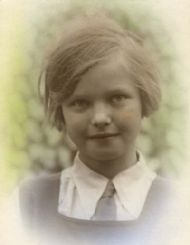 Alison aged about 8 Alison aged about 8Alison as a young girl in Eastbourne, Sussex. c1933 | 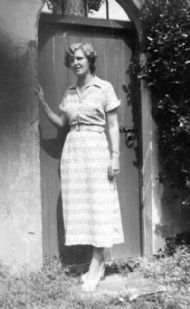 Alison in Eastbourne Alison in EastbourneThis was one of the first photographs that Alison gave to Alastair when they were courting in the very early 1950s. |
|
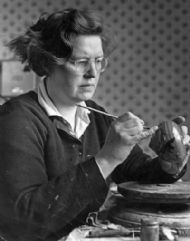 Alison decorating pottery Alison decorating potteryThis photo shows Alison decorating a piece of on-glaze pottery in about 1965. This was shortly after we had moved to Cromarty, and were temporarily living in one of the war huts at the top of Cromarty Sutor whilst looking for a home. | 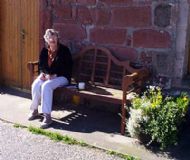 The Boss at Seabank House The Boss at Seabank HouseThis photo, taken in 1999, shows Alison sitting in one of her favourite places - at the gable of Seabank House, Cromarty looking out across the Firth to the North Sutor. The wooden bench has since been replaced by a cast iron one commemorating both Alison and Alastair. |
|
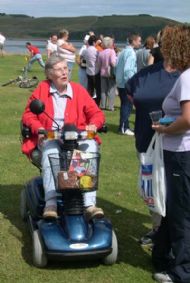 Alison at the Cromarty Regatta 2003 Alison at the Cromarty Regatta 2003This shows Alison attending the regatta on her electric scooter. Sadly the scooter became a necessity after an abortive hip replacement operation at Raigmore Hospital, and a long, slow recovery from MRSA. | 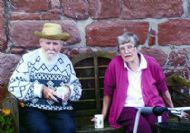 Alastair and Alison, April 2006 Alastair and Alison, April 2006This photo, taken by Fiona, and the last one of them taken together, shows Alastair and Alastair sitting in their favourite place at the gable of Seabank House. Note the horn on Alison's zimmer. Sadly, Alison died only a month or so later, and Alastair died 8 months after that. |
|
 Behold, thou art fair, my love Behold, thou art fair, my loveAlastair's dedication to Alison on his bouquet at Alison's funeral. | 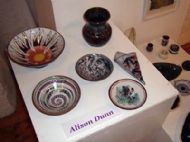 Alison's pottery restrospective Alison's pottery restrospectiveA few of Alison's pottery pieces which were exhibited at the 2006 Cromarty Group Exhibition, an annual exhibition of local artists started by Alison 30 years before. |
|
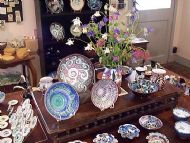 Alison Dunn' Pottery Alison Dunn' PotteryThis shows a few pieces made by Alison and displayed in the Cromarty Pottery Shop. This photo was taken in June 2000, so these must have been some of the last pieces Alison made before she fully retired. Ah, well. | |
|
| |
|
Alison Dunn 1925-2006 - EULOGY
Written by Alex Dunn, and read by him at the Funeral Service
Thank you all for coming. I know that some of you have come a long way, and your presence is treasured.
Ladies and Gentlemen, we are here to say farewell, but also to celebrate a life. However, I would find it impossible to talk in general terms about my mother, so what I am about to relate are my memories of her. Some of them may seem a bit quirky, so bear with me.
Alison Marjorie Ellen Dunn, nee Vernon, was thrawn. She was cussed. Sometimes she was cantankerous. She was stubborn to the point of immovability. She used tactlessness as a sort of conversational equivalent of a heat-seeking missile. And sometimes she was just downright strange. To give you an example: several days after my wife and I had returned from our honeymoon – this was over twenty five years ago, you understand – Alison presented us with a bin-liner full of odd socks. I mean, why? Was this some sort of weird fertility rite of which the anthropologists were not previously aware? Who knows? But at the same time she was loving and loveable. She was sympathetic, loyal, fiercely protective of her children – despite or possibly because of our many faults – and tolerant of others’ idiosyncracies. She was also, despite a husband and six children, very patient.
Some of you may remember that several years ago Alison had a hip operation, which was not successful, and at the same time contracted MRSA, which led to months of boredom, discomfort and misery in an isolation ward in Raigmore. But she survived. And I have the theory that she survived because she’d been practicing.
One of my most enduring and strangely endearing memories is of Alison falling downstairs. This she seemed to do on a regular basis. When we moved from the tin shed up on the Sutor down to the Shore Street house, Alison and Alastair slept in a room in one of the cottages, which was connected to the main house by a staircase which was really no more than a glorified ladder. (As was the case in most of the older Fishertown cottages.) It was vertiginously steep, and had several treads which were either split or rotten, or both. And in my memory Alison would launch herself down this stair at least once a month. It was probably no more than five or six times in all, but in my memory this adventure seemed to come round like bank holidays. There would be a thunderous series of crashes and bangs and hollow thumps, followed by a stunned silence in which nature seemed to hold its breath, and then a plaintive call of, “Will someone please come and help me?”
And the strange thing is that an accident which would have put a normal person at least into hospital if not into a coffin left her with nothing but slight bruising. Several of we children did speculate about the possibility of somehow making money from Alison’s indestructibility, by selling her to a funfair, but nothing came of it.
Alison and Alastair doted on each other, and they complemented each other in many ways. But also, Alison had a toughness, a psychological strength, in a way that seems to be particular to some women. It was she, after all, who started the pottery, and she who made sure that it continued even when it looked as though it couldn’t possibly go on. All it needed was a couple of bad tourist years and things could get very, very tight indeed.
I remember one weekend in particular when there was no money at all. Searches of the back of the sofa and behind the fridge and in the dog basket dug up a grand total of one shilling and tuppence, to do a family of eight for a week. And then a woman came into the shop and bought an armful of pottery, certainly enough to see the family through the next few weeks. No sooner had she left the shop than Alison and Alastair were whirling round the room, whooping with delight and relief and chanting “Money, money, money, money” at the tops of their voices. And in the middle of this mad and noisy celebration the woman came back into the shop to pick up her scarf.
Alison’s strength saw us through these difficult years; but much more difficult were the years Alastair was away at Art School, and then Teacher Training College. Nothing can take away from Alastair’s achievement. Studying in Aberdeen as a mature student. Puttering home through rain, snow, hail and sleet on a clapped-out moped just so he could be home at the weekends. And the weekends spent not only making pottery but also doing course-work for the Art School. And to cap it all, sleeping in a hearse in a back garden in Aberdeen through one of the worst winters since the war.
I am amazed he did so much – my own college years were a cake-walk by comparison. But without Alison at the helm none of it would have been possible, and I have nothing but awe and admiration for the way that she held us all together during these years. Some of us were crashing and blundering our way through our teenage years – I can remember myself as being quite insufferable and obnoxious – and we must have made her life particularly hard and miserable, but it is to her everlasting credit that she didn’t kill any of us.
Like any marriage Alison and Alastair’s had its swings and roundabouts. But one particularly entertaining characteristic was the huff. Alastair would go into a huff, and Alison would tell him not to be an idiot. In how many marriages is that true? But he was and is also a champion procrastinator. Again, some of the older ones here may remember that as well as the pottery my parents used to run a tea-room during the summer months. During hot summers this was very busy, with the room full and other tourists taking trays out to the sea-wall. My sisters and several other girls were kept busy in the kitchen or as waitresses.
One summer, a hot, bright summer with the town packed with tourists and the kitchen packed with girls making scones and sandwiches – one summer, as I say, Alastair hadn’t filled in his tax form. For weeks he hadn’t been filling in his tax form, and Alison was getting increasingly impatient with his excuses. Eventually it all came to a head one day, a particularly hot day, with the tea-room packed and the kitchen heaving – at just the moment when both connecting doors between the tea-room and the kitchen were wide open, the air was suddenly rent with Alison’s exasperated yell: “Oh for God’s sake, Alastair, stop grating the cheese and pay your income tax!” If I ever feel tempted to write Alison’s biography, that will be the title: “Stop grating the cheese and pay your income tax!”
After Alison had had her stroke, several of you used the word ‘independent’ to describe her when you were talking to us. This seemed strange, because when you live close to someone you perhaps don’t see them quite as clearly as others do, others who see from a distance; but yes, after thinking about it I can see that ‘independent ‘ is one of the good words to describe her. When The Cromarty Group was set up over twenty five years ago it included such artists as Sandy Hardie, Charles Bannerman, Mike Taylor and Bill Cowie. These were all larger-than-life personalities and gifted artists, but not perhaps the best people to help organise a group exhibition; and without Alison’s tenacity and determination I am quite sure that the thing would never have got off the ground, far less still be running to this day.
And of course there is the pottery. Alison was born in Eastbourne, and after marriage she moved to Clydebank. Eight years later, with four children, she and Alastair moved to Aultbea near Gairloch. She loved the landscape of the west coast and Inverewe Gardens, which was then more or less undiscovered as a tourist attraction; but she found the west coast society alien, and for a few years she was less than happy. But then she took up pottery again – she had studied pottery at Art School before the Second World War, and in Aultbea she bought in blanks from Stoke-on-Trent and painted them with on-glaze designs.
Then the family moved to Cromarty, and production expanded to include the making of pots and glazes. I can still remember, unfortunately, the rank and cloying smell of burning seaweed from which was prepared a dark-brown glaze. And recently Alison was delighted and amused to discover that not only was there a site in the barras in Glasgow which specialised in her Cromarty pottery, but also that some of her pots has started to appear on Ebay.
A couple of years after we moved into Shore Street Alastair eventually got around to painting a sign. As usual he did it beautifully: Cromarty Design Workshop – Alastair and Alison Dunn. Alison was furious. I can still remember the argument, and that it took me some time to work out what it was all about. She was furious because it was her pottery, she had started it, she had made it grow, and her name should have been first. At the time I thought this was all rather petty; but thinking back, at all her struggles and hard work, I can quite understand her pride in what she had done, and that yes, her name should have been first. And so Alastair had to wait for the paint to dry, paint over the names and then repaint it the right way.
Saying that we will all miss her is what everyone says in these circumstances, but it is no less true for being said so often. I already miss her very much, and I am sure you do too. I feel as though I have lost a trusted guide, and I feel guilty at having lost her. And of course Alastair has lost so much more.
Lastly, over the last fortnight all of you have wanted to talk about Alison, to give your support and sympathy, and for that we are very, very grateful. It has been a great help. After the internment refreshments will be provided in The Brewery. You are all very welcome to join the family there.
And very lastly, for those with an interest in such things: the bag of odd socks worked, and within a couple of years Alison was presented with the first of her grandchildren.

 Birth: 28 May 1925
Birth: 28 May 1925







